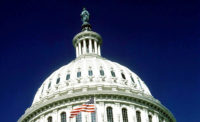With the House poised to vote on an Obamacare replacement this week, health care and advocacy organizations are becoming more vocal in their objection to it – and urging their members to do the same.
The American Medical Association (AMA), AARP, American Hospital Association (AHA), American Public Health Association (APHA) and American Psychological Association are among the groups who’ve said the proposed GOP legislation would be a “disaster” that would cause millions of Americans to lose health care coverage.
An American Hospital Association TV ad.
In a letter to Congress, the AMA conceded that the Affordable Care Act, or Obamacare, is imperfect, and has a number of issues that need to be addressed. However, “in considering opportunities to make coverage more affordable and accessible to all Americans, it is essential that gains in the number of Americans with health insurance coverage be maintained” – something that the proposed American Health Care Act (AHCA) would not do, according to its detractors.
Medicare effects, an "age tax"
The AARP, which represents 38 million Americans aged 55+, took aim at what it said would be the bill’s effects on Medicare.
“It would “weaken Medicare's fiscal sustainability, dramatically increase health care costs for Americans aged 50-64 and put at risk the health care of millions of children and adults with disabilities, and poor seniors who depend on the Medicaid program for long-term services and supports and other benefits," said Joyce A. Rogers, a senior vice president at AARP, in a letter.
Rogers went on to say that Obamacare helped strengthen Medicare, and that a tax cut for higher income workers in the American Health Care Act "could hasten" the program's insolvency.
One provision in the bill would allow insurers to charge older people more, which the AARP is calling an “age tax.” Republicans say it would help lower premiums for younger people.
The AARP is running radio ads in key congressional states and says it will let its members know how their representatives voted on the bill.
Campaign promises cited
The American Hospital Association is running TV ads featuring a clip of Donald Trump during the presidential campaign in 2015 promising that “everybody’s got to be covered” and “Everybody’s going to be taken care of – much better than they’re taken care of now.” The ad goes on to warn that despite that promise, millions of people would lose coverage if the AHCA is passed.
The American Psychological Association (APA) says recent analysis by the Congressional Budget Office shows that the AHCA would significantly decrease Americans' access to mental health and substance use disorder services, including behavioral health treatment, “and by 2026 would take coverage away from an estimated 24 million people who would have otherwise been covered under current law.”
Physicians' group welcomes replacement
The Association of American Physicians and Surgeons, however, welcomes the overturn of the ACA, which it called “a badly structured cost-sharing program” that has created “nothing but chaos.” The group cited rising health care costs and shrinking provider networks in its opposition to Obamacare.
The American Action Network, a group which supports House GOP leaders, has spent $10 million on a campaign – which includes digital ads -- to generate lawmaker support for the bill.
U.S. Chamber of Commerce supports the bill, saying that “it eliminates (or delays) some harmful taxes from the Affordable Care Act and preserves the employer-sponsored system millions of Americans rely on.”
"Harmful provisions" would go, says Chamber
In a letter to Congress, U.S. Chamber's Senior Vice President and Chief Policy Officer Neil Bradley said the bill would “repeal a substantial number of the most harmful provisions in the Affordable Care Act: the health insurance tax, the medical device tax, and the tax on prescription medications; restrictions on the use and limitations on contributions to health savings accounts and flexible spending accounts; and the penalties associated with the employer mandate.”





